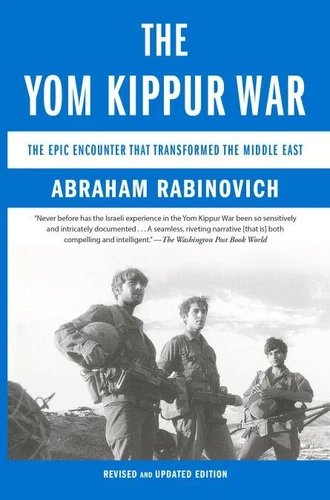The Yom Kippur War. The Epic Encounter That Transformed the Middle East
Par :Formats :
Disponible dans votre compte client Decitre ou Furet du Nord dès validation de votre commande. Le format ePub protégé est :
- Compatible avec une lecture sur My Vivlio (smartphone, tablette, ordinateur)
- Compatible avec une lecture sur liseuses Vivlio
- Pour les liseuses autres que Vivlio, vous devez utiliser le logiciel Adobe Digital Edition. Non compatible avec la lecture sur les liseuses Kindle, Remarkable et Sony
- Non compatible avec un achat hors France métropolitaine
 , qui est-ce ?
, qui est-ce ?Notre partenaire de plateforme de lecture numérique où vous retrouverez l'ensemble de vos ebooks gratuitement
Pour en savoir plus sur nos ebooks, consultez notre aide en ligne ici
- Nombre de pages592
- FormatePub
- ISBN978-0-307-42965-0
- EAN9780307429650
- Date de parution18/12/2007
- Protection num.Adobe DRM
- Taille27 Mo
- Infos supplémentairesepub
- ÉditeurSchocken
Résumé
An updated edition that sheds new light on one of the most dramatic reversals of military fortune in modern history. The easing of Israeli military censorship after four decades has enabled Abraham Rabinovich to offer fresh insights into this fiercest of Israel-Arab conflicts. A surprise Arab attack on two fronts on the holiest day of the Jewish calendar, with Israel's reserves un-mobilized, triggered apocalyptic visions in Israel, euphoria in the Arab world, and fraught debates on both sides.
Rabinovich, who covered the war for The Jerusalem Post, draws on extensive interviews and primary source material to shape his enthralling narrative. We learn of two Egyptian nationals, working separately for the Mossad, who supplied Israel with key information that helped change the course of the war; of Defense Minister Moshe Dayan's proposal for a nuclear "demonstration" to warn off the Arabs; and of Chief of Staff David Elazar's conclusion on the fifth day of battle that Israel could not win.
Newly available transcripts enable us to follow the decision-making process in real time from the prime minister's office to commanders studying maps in the field. After almost overrunning the Golan Heights, the Syrian attack is broken in desperate battles. And as Israel regains its psychological balance, General Ariel Sharon leads a nighttime counterattack across the Suez Canal through a narrow hole in the Egyptian line -- the turning point of the war.
Rabinovich, who covered the war for The Jerusalem Post, draws on extensive interviews and primary source material to shape his enthralling narrative. We learn of two Egyptian nationals, working separately for the Mossad, who supplied Israel with key information that helped change the course of the war; of Defense Minister Moshe Dayan's proposal for a nuclear "demonstration" to warn off the Arabs; and of Chief of Staff David Elazar's conclusion on the fifth day of battle that Israel could not win.
Newly available transcripts enable us to follow the decision-making process in real time from the prime minister's office to commanders studying maps in the field. After almost overrunning the Golan Heights, the Syrian attack is broken in desperate battles. And as Israel regains its psychological balance, General Ariel Sharon leads a nighttime counterattack across the Suez Canal through a narrow hole in the Egyptian line -- the turning point of the war.
An updated edition that sheds new light on one of the most dramatic reversals of military fortune in modern history. The easing of Israeli military censorship after four decades has enabled Abraham Rabinovich to offer fresh insights into this fiercest of Israel-Arab conflicts. A surprise Arab attack on two fronts on the holiest day of the Jewish calendar, with Israel's reserves un-mobilized, triggered apocalyptic visions in Israel, euphoria in the Arab world, and fraught debates on both sides.
Rabinovich, who covered the war for The Jerusalem Post, draws on extensive interviews and primary source material to shape his enthralling narrative. We learn of two Egyptian nationals, working separately for the Mossad, who supplied Israel with key information that helped change the course of the war; of Defense Minister Moshe Dayan's proposal for a nuclear "demonstration" to warn off the Arabs; and of Chief of Staff David Elazar's conclusion on the fifth day of battle that Israel could not win.
Newly available transcripts enable us to follow the decision-making process in real time from the prime minister's office to commanders studying maps in the field. After almost overrunning the Golan Heights, the Syrian attack is broken in desperate battles. And as Israel regains its psychological balance, General Ariel Sharon leads a nighttime counterattack across the Suez Canal through a narrow hole in the Egyptian line -- the turning point of the war.
Rabinovich, who covered the war for The Jerusalem Post, draws on extensive interviews and primary source material to shape his enthralling narrative. We learn of two Egyptian nationals, working separately for the Mossad, who supplied Israel with key information that helped change the course of the war; of Defense Minister Moshe Dayan's proposal for a nuclear "demonstration" to warn off the Arabs; and of Chief of Staff David Elazar's conclusion on the fifth day of battle that Israel could not win.
Newly available transcripts enable us to follow the decision-making process in real time from the prime minister's office to commanders studying maps in the field. After almost overrunning the Golan Heights, the Syrian attack is broken in desperate battles. And as Israel regains its psychological balance, General Ariel Sharon leads a nighttime counterattack across the Suez Canal through a narrow hole in the Egyptian line -- the turning point of the war.



